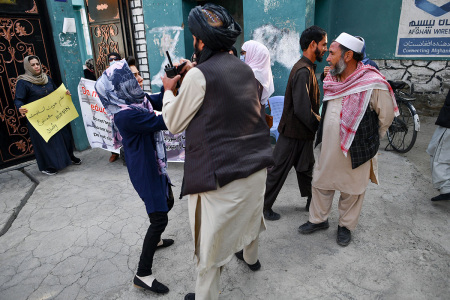Taliban committing war crimes, kills 13 including 17-year-old girl: report

The Taliban executed 11 ex-defense personnel and two civilians, including a 17-year-old girl in Afghanistan’s Daykundi province, all of whom were from the ethnic Shia minority, according to an investigation by Amnesty International, which says the killings appear to be war crimes.
The Taliban killed 11 former members of the Afghan National Defence Security Forces, nine of whom had surrendered, and two civilians in Kahor village of Khidir district on Aug. 30, about two weeks after taking control of Daykundi province, the human rights group says in the investigative report, which is based on eyewitness testimony and photographs and video evidence.
All the victims were from the ethnic Hazara community, a Shia minority in the Sunni majority country.
After the Taliban took control, about 34 ANDSF members, who had government military equipment and weaponry, sought safety in Khidir district and then agreed to surrender. On Aug. 29, the men negotiated to surrender fully to the Taliban.
On Aug. 30, about 300 Taliban fighters arrived in a convoy close to Dahani Qul village, where the ANDSF members were staying, some with family members. As the ANDSF members attempted to leave the area with their families, one vehicle remained stuck close to Kahor village, the report says.
“When the Taliban fighters caught up with them, they opened fire on the crowd and killed the 17-year-old girl, named Masuma. One of the ANDSF members then fired back, killing one Taliban fighter and wounding another.
“The Taliban continued to shoot as the families fled, killing two ANDSF members caught in the crossfire as they were fleeing the scene. After nine more ANDSF members surrendered, the Taliban promptly took them to a nearby river basin and executed them,” the report adds.
The day after the killings, the Taliban told remaining family members that anyone who had fled should return and surrender within three days. One senior Taliban official warned, “I have killed people for the past 20 years. Killing is easy for me. I can kill again.”
Amnesty International’s Secretary General Agnès Callamard called the killings “cold-blooded executions,” and said they are “further proof that the Taliban are committing the same horrific abuses they were notorious for during their previous rule of Afghanistan.”
“They repeatedly violate the rights of those they perceive as their adversaries, even killing those who have already surrendered. The Taliban say they are not targeting former employees of the previous government, but these killings contradict such claims,” Callamard added.
Last month, the International Criminal Court’s prosecutor asked the court to relaunch an inquiry to investigate not only past but also contemporary crimes against humanity committed by the Taliban and supporters of Islamic State in Afghanistan since 2003, The Guardian reported at the time.
A previous ICC inquiry was deferred in April 2020 after the then Afghan government of Ashraf Ghani requested more time to gather evidence in cooperation with ICC lawyers.
“Odious and criminal acts should stop immediately and investigations commence to vindicate the principles that were established 75 years ago at Nuremberg and to honor humanity’s basic responsibility to itself,” ICC Prosecutor Karim Khan was quoted as saying.
The Taliban publicly declared last month that they would carry out executions and other brutal punishments, including amputations, under Islamic Sharia law as part of their rule in Afghanistan.
“Cutting off of hands is very necessary for security,” Mullah Nooruddin Turabi, a member of the Taliban’s interim government and chief enforcer of the group’s strict interpretation of Sharia law, told The Associated Press at the time.
“Everyone criticized us for the punishments in the stadium, but we have never said anything about their laws and their punishments,” he continued. “No one will tell us what our laws should be. We will follow Islam and we will make our laws on the Quran.”
Turabi, who is under U.N. sanctions, also said the new government is considering carrying out such punishments in public.
Following the withdrawal of U.S. troops in Afghanistan, the Taliban quickly seized control of much of the country, eventually taking the capital Kabul in August and forcing the government to flee.
In response to the unexpected speed at which they retook the nation, U.S., British and French troops evacuated tens of thousands of Afghans, Americans, British and Europeans out of the country. It’s been reported that many U.S. and British citizens and U.S. green card holders are still waiting to be evacuated.
The U.S. withdrawal marked the end of the war in Afghanistan, which spanned nearly two decades.





















